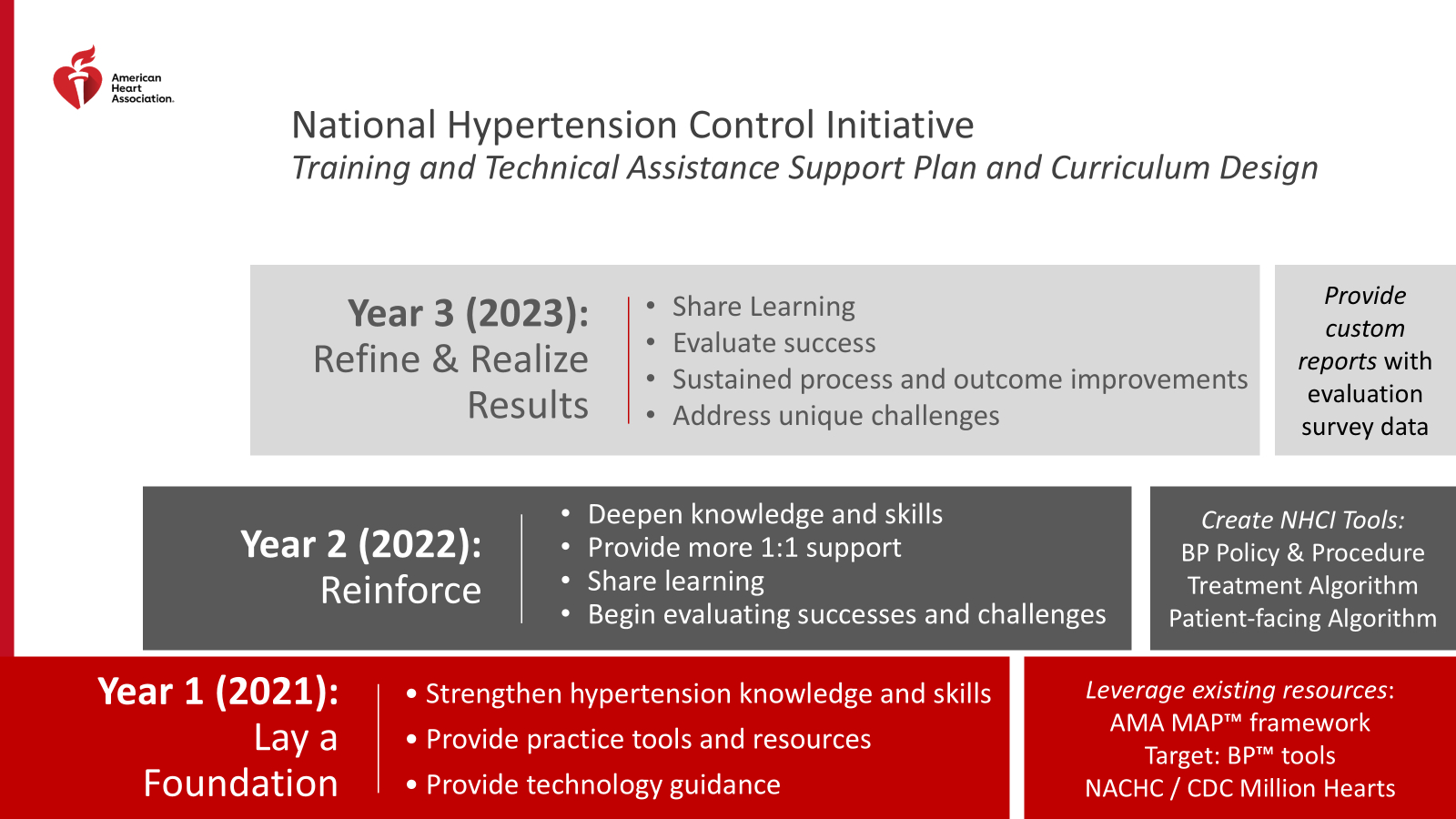Final ID: P2057
Virtual Hypertension Control Training and Technical Assistance Curriculum Design Helps Meet Community Health Center Learning Needs
Abstract Body: The 2020 Surgeon General’s Call to Action to Control Hypertension urged the nation to prioritize hypertension control, strengthen community support, and optimize patient care. In late 2020, the US Department of Health and Human Services launched the National Hypertension Control Initiative (NHCI), awarding 350 federally supported community health centers (CHCs) with 3-year grants to improve hypertension control by leveraging self-measured blood pressure (SMBP) monitoring with training and technical assistance from the American Heart Association (AHA).
Designing a clinical core curriculum embracing the strategies named in the Surgeon General’s report can optimize patient care and support hypertension control efforts with use of standardized, guideline-recommended care, team-based care, SMBP monitoring, and recognition of exemplary CHCs.
The 3-year curriculum was designed to lay a foundation of hypertension fundamentals through didactic webinars, practical workshops, and interactive office hours in 2021, reinforce key concepts and introduce additional standardized tools for blood pressure measurement and treatment in 2022, and use evaluation data to focus quality improvement efforts and recognize success stories in 2023. The plan was rooted in the AMA MAPTM framework and featured new NHCI tools and existing resources from Target: BPTM and others.
From 2021-23, 49 events drew a total of 8198 participants. Live knowledge comprehension and readiness polls were used to gauge needed reinforcement and curriculum pacing, respectively. For example, 15 pre/post knowledge check questions posed during the Year-1 events, where 73% showed improvement with the % correct ranging from 12.5-98.0%, informed the design of subsequent events. Average annual post-event evaluation scores demonstrated participants agreed/strongly agreed that the depth (90-95%), utility (90-96%), and pace (73-84%) of the training was appropriate. The likelihood that participants would make changes based upon the training ranged from 59-75%. As previously published, numerous exemplary CHCs improved control rates from less than 58% to greater than 70%, and blood pressure control rates for all NHCI health centers had a relative improvement of 12.3% from baseline to 2022 with 2023 data pending.
The design of a virtual curriculum appeared to meet the learning needs of participants and enabled health centers to strengthen practices, deploy SMBP programs, and improve blood pressure control.
Designing a clinical core curriculum embracing the strategies named in the Surgeon General’s report can optimize patient care and support hypertension control efforts with use of standardized, guideline-recommended care, team-based care, SMBP monitoring, and recognition of exemplary CHCs.
The 3-year curriculum was designed to lay a foundation of hypertension fundamentals through didactic webinars, practical workshops, and interactive office hours in 2021, reinforce key concepts and introduce additional standardized tools for blood pressure measurement and treatment in 2022, and use evaluation data to focus quality improvement efforts and recognize success stories in 2023. The plan was rooted in the AMA MAPTM framework and featured new NHCI tools and existing resources from Target: BPTM and others.
From 2021-23, 49 events drew a total of 8198 participants. Live knowledge comprehension and readiness polls were used to gauge needed reinforcement and curriculum pacing, respectively. For example, 15 pre/post knowledge check questions posed during the Year-1 events, where 73% showed improvement with the % correct ranging from 12.5-98.0%, informed the design of subsequent events. Average annual post-event evaluation scores demonstrated participants agreed/strongly agreed that the depth (90-95%), utility (90-96%), and pace (73-84%) of the training was appropriate. The likelihood that participants would make changes based upon the training ranged from 59-75%. As previously published, numerous exemplary CHCs improved control rates from less than 58% to greater than 70%, and blood pressure control rates for all NHCI health centers had a relative improvement of 12.3% from baseline to 2022 with 2023 data pending.
The design of a virtual curriculum appeared to meet the learning needs of participants and enabled health centers to strengthen practices, deploy SMBP programs, and improve blood pressure control.
More abstracts on this topic:
Atherosclerotic Cardiovascular Disease Risk Management in a Primary Care Residency Clinic
Manalo Kathryn, Tieliwaerdi Xiarepati, Jackson Megan, Arrigo Alexis, Mascara Mariah, Maharjan Srijana, Gadani Mrudula
A Pharmacist Medication Titration Program for Patients with Cardiac Sarcoidosis and Systolic Heart FailureSykora Daniel, Giudicessi John, Cooper Leslie, Rosenbaum Andrew, Olson Nicole, Churchill Robert, Kim Boyoung, Bratcher Melanie, Elwazir Mohamed, Young Kathleen, Abou-ezzeddine Omar, Bois John

